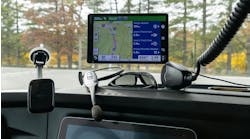When it comes to technology investments, even for smaller fleets, "I think it's the cornerstone of their business," Roni Taylor, SVP of strategy and business development for trailer telematics provider Spireon, told FleetOwner. "You need it to compete. You need it to remain competitive."
Taylor said fleets of all sizes must invest in up-to-date asset tracking and telematics solutions to remain competitive in the marketplace, as 47% of fleets surveyed prioritize investing in transportation management systems to more effectively manage and utilize their assets.
"I don't care if you're Estes Express with 40,000 pieces of equipment, or you're a small guy with 100 trailers," she said. Though in the past it might have been sufficient for a carrier to utilize a trailer for one or two trips per week, now "you're not going to make enough money, so you want to increase that as much as possible, and the only way to do it is to know where those trailers are at any given time."
See also: Keeping connected: Trailer tracking, planning, and future-proofing
Spireon also provides cargo sensors, which, Taylor said, can improve trailer utilization and eliminate redundancies. She gave the example of a scenario in which trailers have been sitting at a customer's location unused for 10 days. With cargo sensors, carriers can learn which trailers lie unused and take back them back to reappropriate them where needed.
See also: How 3PLs, shippers are combating challenges with technology
The company's IntelliScan ProView cargo sensor, for instance, is installed inside trailers near the doors to allow fleets to see how much of the trailer is being used.
"There are some private fleets that are using that because they want to make sure they're using it for inventory management. They want to know how much product is on that trailer," Taylor said, adding that less-than-truckload fleets "want to make sure that as they're going through their loading process and that they're loading every square inch of that trailer."
Taylor said Spireon has seen a large increase in small- and medium-sized businesses adopting trailer tracking in the last three years, and the past quarter's sales were "through the roof" since fleets wanted to compete.
"What carriers do is, when they're trying to get as much freight as possible," Taylor said, "sometimes they feel like they have to buy more trailers to have them available. But if you install trailer tracking, you can know where your trailers are at all times, and in many cases, you don't have to buy new trailers. When the economy shifted right after COVID and we were all buying things left and right at home, nobody could get their hands on enough trailers. But I think that's still the case, so just having that visibility into where the trailers are at all times gives them that competitive edge."






